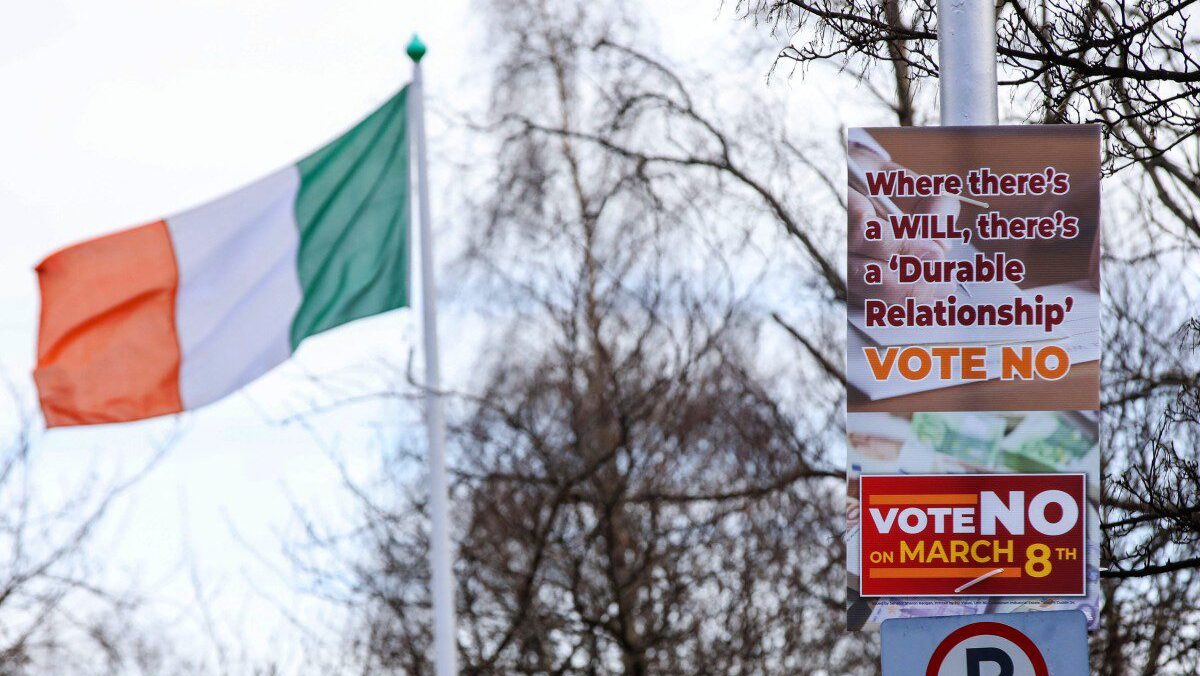
Photo: PAUL FAITH / AFP
The Irish electorate looks like having solidly rejected two constitutional amendments that would have erased the word “woman” from the Irish constitution and altered the legal definition of family in what is shaping up to be a 70-30 shock victory for tradition over the nation’s well-financed NGO lobby.
Landslide for the No vote in Dublin South Central in early #tallies pic.twitter.com/n0q037KERh
— Peadar Tóibín TD (@Toibin1) March 9, 2024
Voters were deciding on two separate questions in the referenda—symbolically held on International Women’s Day, Friday—to widen the legal definition of family to include same-sex relationships and single parents, as well as to delete constitutional provisions that recognized the role women play in the household.
The past few years have seen significant changes to the Republic’s 1937 constitution, Bunreacht na hÉireann, by progressive elites, culminating in the legalisation of abortion by popular vote in 2018 in a rapid decade of liberalisation for the Catholic country.
Now, that slide to the left looks like it’s retreating—at least temporarily.
Throughout the month-long campaign, polls had shown a strong ‘yes’ victory. Today’s unforeseen upset is likely to send ripples through the corridors of power in Dublin, as the results were overwhelming enough for media agencies to call the two referenda in favour of the ‘No’ side only an hour into counting. Even traditionally liberal constituencies in South Dublin look like they are rejecting the progressive agenda this time.
The result is being directly tied to growing disquiet over migration. Working-class areas of Dublin turned out strongly against the government and the left-wing opposition party Sinn Féin by voting No. The official ‘No’ campaign consisted of a coalition of Catholic and anti-transgender feminist groups and legal experts who expressed concern with the new amendments.
Ireland’s Attorney General already back in December advised the government that vague phrasing of the referenda could cause legal chaos—something that only became public the day before the vote, when Irish news site The Ditch published the opinion.
Government ministers have admitted that the redefinition of family would likely impact migration when it came to polyamorous asylum seekers.
NEAL RICHMOND(FG) LET'S CAT OUT OF BAG
— The Flying Column (@flyingcolumn8) March 5, 2024
Ref is really abt opening the floodgates, replacing the Irish, seizing total control
"changing definition of family, has serious consequences for immigration, for family reunification, this will allow that to be accommodated"#VoteNoNo https://t.co/taCRedy4Ap pic.twitter.com/clXWTrCDDn
The Chair of the Electoral Commission became a viral sensation by saying that merely a Christmas card addressed to a couple could be cited as legal evidence of being effectively married in the eyes of the law.
IRELAND
— Catholic Arena (@CatholicArena) January 25, 2024
A member of the Electoral Commission has said that a couple who receive a Christmas Card will be recognised as 'durable relationship' if the unpopular government's March 8th Referendum passes#VoteNoRef24 #VoteNo #VoteNoNo pic.twitter.com/Bf4J9phwvk
Jubilant at the defeat of the government side, the Catholic Family Solidarity group issued a statement on the significance of the result, saying “this vote stands as a critical moment in Irish history, marking the end of an era dominated by liberal conformity” and praised the grassroots ‘No’ campaign that, the organisation said, “fuelled by the conviction and dedication of ordinary citizens, has successfully fought back against the pressures of liberal agendas.”
MPs (TDs), meanwhile, publicly turned the knife on the government for running such a hubristic campaign.
Labour leader Ivana Bacik and Labour Senator Marie Sherlock in RDS say a No-No result would be due to a “lacklustre government campaign”.
— Una Kelly (@UnaKelly3) March 9, 2024
Marie Sherlock: “This government went out and completely failed to sell their referendum”. She said ministers were missing in action pic.twitter.com/4XqzzuArLM
Many on the winning No side have opined that today marks the end of the era where the Irish elite could complacently count on a liberal majority as the country begins to experience the negative effects of mass immigration.
Saturday’s referenda results are likely to set the tone for June’s local and European elections in Ireland as well as a potential general election later in the year. Immigration is becoming a defining issue of Irish politics on the back of a year of grassroots protests against asylum centres as well as November’s Dublin riots, triggered by an Algerian migrant stabbing three schoolchildren and a teacher.
